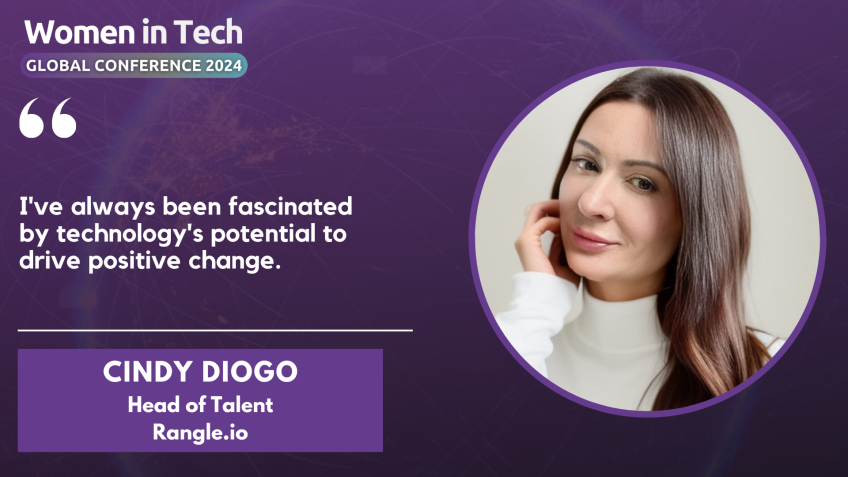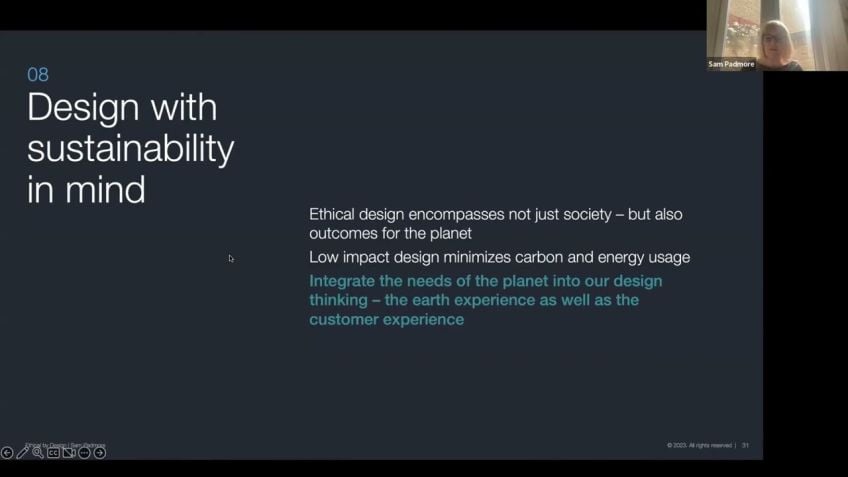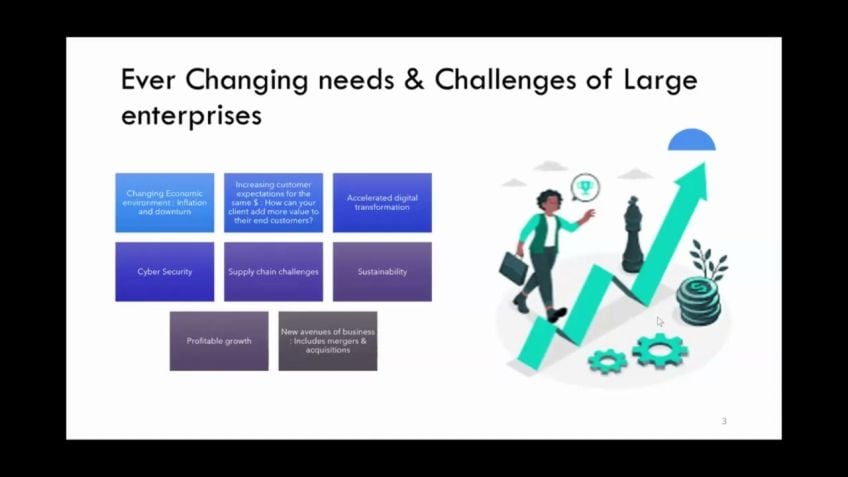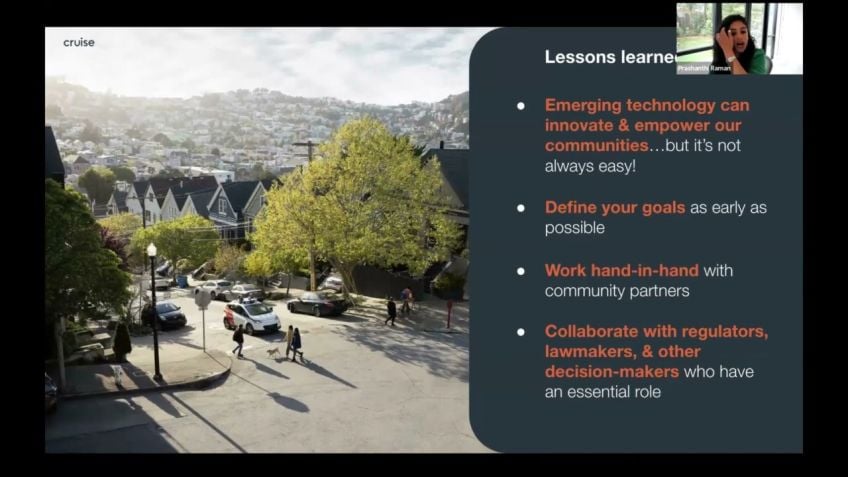The Evolving Workplace – How sustainable is yours?
Joanne Thurlow
Executive Director & CofounderThe Evolving Workplace and Sustainability: An Insightful Discussion by Joan
As businesses continue to evolve, the importance of sustainability has never been more apparent. Recently, one of the ESG Institute’s co-founders, Joan, a veteran with 25 years’ tech industry experience, shone a spotlight on this issue at an exciting conference. Joan’s analytical insight and hands-on experience from successfully integrating sustainability practices into businesses have made her a force to reckon within the realm of sustainable development.
ESG Integration as a New Normal for Business Sustainability
The ESG Institute, an organization committed to assisting organizations implement environment, social and governance principles into their corporate strategy, operations, and culture, leads the way in the evolving world of sustainability. They are committed to creating a more sustainable and equitable future through their ESG training, qualifications, business advisory services, and accreditations.
Addressing the Challenges in Today’s Workplace
In today’s rapidly evolving workplace, businesses are facing numerous challenges – from changing labor policies to increased focus on digital skills and looming future supply chain demands. With the current competition landscape, companies struggle to retain their employees while tackling knowledge areas like sustainability and climate change. Amid this backdrop, it is imperative for businesses to cultivate sustainability skills.
The Urgency of Climate Change and Its Impact
“We can't begin to address climate change at the speed and scale needed without developing our workforce,” Joan emphasizes. As the glooming climate crisis becomes more apparent, businesses worldwide must rise and tackle the challenges it presents. Our race against time is no longer a mere concept but a reality.
Mapping Sustainability in the Modern Workplace
Trending Demand for Green Skills
Predicted by the International Labor Organization, green skills will give rise to an estimated 24 million new jobs worldwide by 2030, an incredibly short window of time for businesses to comprehend and develop sustainability skills around their workforce. This rapid proliferation of need will surely spur a wave of opportunities, specifically in industries such as carbon accounting, lifecycle analysis, and supply chain sustainability.
Understanding and Addressing the Skills Gap
To sow the seeds of a sustainable workforce, businesses must first recognize their existing skills gap and prepare practical strategies to cultivate their talent. Consider exploring potential partnerships with other organizations or supporting policymakers to develop universally accepted training requirements. Continuous training and a dedication to fostering sustainability skills are integral factors to achieving a successful green transition.
Embracing Change and Cultivating Sustainability Competencies
Adaptability and a comfortability with change management are standout competencies that enable businesses to navigate through sustainable transitions with agility. Joan believes that these skills are vital for individuals and businesses alike who are grappling with the world's urgent environmental needs. The path to a sustainable future demands a collective effort, and no sole entity can conquer these challenges alone.
Wrapping up
Joan's insightful discussion on the evolving workplace and the importance of sustainability serves as a compelling wake-up call for businesses worldwide. Now, more than ever, is the time for businesses to re-evaluate their sustainability strategies, enhance their green skills, and work together to propel towards a sustainable future.
Questions after reading the article? Feel free to connect with Joan on LinkedIn. She’d be happy to answer your questions and provide further support.
Video Transcription
Hi, everyone, Joan here and welcome to the evolving workplace. How sustainable is yours? Thank you for taking time to join this talk today. Um Throughout the course of this overall amazing conference that gets put on every year.And if you're here just so you are aware, I am going to be using the chat to try to track your questions, but I will try to leave any question and answer to the end of the presentation. OK. Why is that? Sorry? I'm having a bit of a technical difficulty here in that. Oh, there we go. OK, we're, we're on. So I'm here as one of the co-founders for the ESG Institute organization presenting to you today. And we're an organization that is dedicated to helping businesses adopt and integrate environment, social and governance principles into their strategies, operations and culture to create a more sustainable and equitable future. And we're doing that through providing ESG training, qualifications, business advisory services and accreditations in, in terms of sustainability. Uh Myself, I have been in the tech industry for over 25 years. I wear a multitude of hats um from the being a director within the ESG Institute to public speaking, non director and so on.
Uh I do also have a 10 years of work in the energy and tech sector within Siemen's energy where I was the global head of it. So I am very much used to working with sustainable topics and technologies from the upstream level. And now I am bringing that to the downstream, which is for the particularly SME S and medium sized businesses and so on to really help them understand what's ahead from an ESG perspective. Now, in today's workplace, it is very much evolving and, and many of you will be directly aware of the challenges that are taking place in today's workplace. Um You know, everything from change in labor policies, digital skill demand and focus on digital skills, the future supply chain demands that are going to be needed. The companies and organizations struggle to attract and retain employees because there's so much competition out there, areas of knowledge of of sustainability, uh climate change SDG. So you can see from all of this with reading all of the words in this cloud that there is a lot happening in our workplace today, for individuals, for professionals, for managers and for organizations overall.
And it is with this as a backdrop even in response to the digital transformation that is coming post COVID, we now have the issues around sustainability skills that need to be thought about and and be businesses need to plan for through training and, and such now why is this such a big topic?
And, and where are we at? Well, we all are familiar with the climate change and the global warming that is happening, you know, with the Paris Agreement of keeping any carbon increases to 1.5%. Temperature is very unlikely to be met at this point in time by 2030 the net zero by 2030 for example, and we have an additional challenge in that globally, we have a carbon budget. So this is the amount of carbon globally we can put into the, into the air of 440 gigatons. Now, this number varies depending on whose calculations you're using, but generally, this is the most accepted target. Um And that the rate we're going today, even with the efforts to reduce sustainability, we estimate that within 11 to 15 years we're going to hit that rate. So clearly, it is a race against time. Now, we can't begin to address climate change at the speed and scale that's needed without developing our workforce. And what's important with this is is to really remember that many companies are still struggling to understand what that major impact is going to be and um and, and just deal with where they're at at the moment. So how did we get to this?
I mean, this is a global in this picture. I really like this picture because it captures how we've gotten to this point very succinctly as they say, a picture is worth 1000 words. So you know, you take a look at small disposable uh single use package of pears that are grown in Argentina. So on one continent, they're grown there through obviously agriculture, there's the water impact and so on. That happens as you, you grow that level of food, then they're going over to Thailand where they're being packaged and then they're going back to North America or maybe into Europe, whatever and then being transported around so that you can go into the stores and for what might be the equivalent of a pound or you know, £2.02 euros, something along those lines.
Um and you can have a single portion with disposable plastics, single use plastics as well. So when you look at the whole production line here, it tells the story of why sustainability is happening at the rate that it is, it just really helps to illustrate it and it means that it's a bit more um relatable for us. Now, when we talk about all of these changes that are happening, then when we get into organizations, the impact and the changing needs are also substantial. Now, we all I think are pretty much aware that most organizations today are needing to um look at their own strategies, put strategies in place. Uh They have maybe a strategic plan for how they're going to go forward. Perhaps they've already started doing some reporting alongside of it.
But as they start to look more into it, they really need to take a look at what is happening with the skills within their own organizations that are going to be needed. And this is a conversation that is happening in different parts, but not to the level that it needs to be for us to to achieve what those overall targets are. So when we talk about the impact of the skills gap, so there's really two areas, role categories that are directly impact impacted. So there will be those very specialized, dedicated sustainability positions often referred to as green jobs. Uh you know, could be in, in agriculture, could be in forestry or water management, those type of areas and those tend to be very specific and and highly skilled, but the broader roles within all organizations. And by that, I mean, that includes the management, it includes the the the managers themselves, the teams, they all need some level of sustainability knowledge in order to do their jobs going forward, this will get integrated into everything. Now, when we look at those skill requirements, I had mentioned deep and specialized such as carbon accounting, which is where a lot of activity is happening right now. Carbon removal and so on. Um broader teams will need limited deep knowledge, but then a more broader, broader source.
So for example, if you work in supply chain, this is where you may need to deep dive and have some very specialized skill sets and then be more water based. But across the entire organization, there has to be a level of basic fluency and understanding of sustainability for going forward as well. That these are obviously gaps that are um not necessarily being considered by companies right now, but will need to be the International Labor Organ Labor Organization is estimating conservatively that the green skills will be leading to the need for the green skills will lead to an estimated 24 million net new jobs worldwide by 2030.
That's only in seven years. That's a short window of time to not only understand what does it mean to have sustainable skills. What skills do you need? How do you get those skills from whom you're going to get them and then bring it into your organization? Now, I say that's, that is a conservative number because now with things like A I and the other technologies that are coming into play that that is starting to um that number could change dramatically. And by net new, that also means that there will be losses of certain types of jobs through some of these changes such as some of the administrative or with machine learning replacement, a automation people on, on assembly lines or so forth to new jobs and new skills or upskilling or, or re skilling the existing employees as well.
So business is now starting to think about this and they grow, their concerns are growing very quickly. And many of the conversations I've been having with, with companies from all across Europe and North America in particular, they're starting to, to understand they have to do something.
But the question that I'm often hearing is what do I really need to do? What do I need to know? What? Don't I need to know? How can I shorten that and how can I still face all of the other challenges as my business and keep going forward? So when it comes to the enormity and the urgency of the climate change, um it can be a very hard thing for people to get their head around and you know, this should have been urgent long ago, but it isn't not yet. So that still has to, there still has to be conversations or an awareness level to make things more urgent. Um you know, the the expectations to progress on net zero, poor reporting could have a bad impact for a company, the public in in image, sorry. Um a lot of businesses right now, I mean, the struggle with economic turbulence and so on. So they may not be willing or may not have the funding available to put into these initiatives. But the skill gap is still growing. And for those who are starting to address it, most companies are looking to have homegrown talent so they're bringing and taking their own people and developing in these areas. So what we really need to progress is in the global collective understanding regarding job sustainability knowledge and the skills that are needed. Now, obviously, there's some areas or some industries where there will be specialized skills, but there's still a common framework that is needed.
Work is being done around that area. But there's still a lot of agreement that has to happen. Employers need to start upskilling their workforces now. And we also need to look at how we can do partnering and bring some of this into the schools for the future jobs that are going to be created. And this is an interesting quote from um Brad Smith of Microsoft, you know, in the history of civilization, civilization, few generations have needed to do as much in as little time as we must do right now and what they're expecting, what we need to do in terms of development is the amount of technology and, and growth.
We've had innovation in the last 100 years. We really need to compress that down into about 10 years. If we have a hope of achieving the net zero targets as we go forward and over time, just as we saw within the space and, and the introduction of technology and computers into schools, it became mainstream into our academic system, including early education. This is what we'll likely see in the future when it does come to sustainability as well. Now, the current gap, so if you want to build a workforce, you need to look at what your current gap in skills are your structure, your pipeline, uh you know, time is running out. So we really need to start looking at those initiatives to get core green skills going. Um You know, millions of workers are going to be needed. Millions of workers are gonna need to be upskill new skilled, um re skilled as we go along. And at the heart of all of this will be those workers who design drive and track progress towards the goals.
There's a lot of opportunities coming up, particularly in carbon accounting, a life cycle analysis, supply chain sustainability is expected to be in one of the highest demands as we go forward. So it's going to become critical that we have the right skills, knowledge and capacities, capabilities to upscale and evaluate the new tools, the processes and the technologies that are going to be needed. Now, we're seeing that the demand for green skills are growing across all the different industries.
And um as we've said, you know, there will be the need for multidisciplinary uh sustainability needs to be embedded into day to day operations, which means people need to have at least a basic fluency and ability to, to converse around the sustainability topics. Um Now, what's really interesting to see is that the digital skills are so important to all of this. And what we're seeing also is that people need to develop much more of a multidiscipline skill set as they go forward. And by that, what we mean is that there has to be a degree of system thinking in place, you know, future circular thinking design thinking along with the basic skills that, that you would have such as the digital skills. Whereas, you know, if you look at someone who say is a carbon accountant, um who's doing a accountancy and doing the carbon accounting accounting, you know, traditionally, they just needed the accountancy skills, but today, they're going to need specialized skills in the type of reporting that has to happen.
Um So, and you can also see here, the digital skills and technology are absolutely critical for this going forward. This data is from uh a report done by Microsoft and Boston Group just as of late last year, very current in terms of the analysis that they've done. Um So, yeah, please uh try to take a, take a look for it if you're going to deep dive into this area a little bit more. Sorry, my computer is hanging up. Ok. So what might a sustainable workforce? And I'm cognizant, we're going very quickly run out of time. So as I mentioned, there's the carbon accountant accountancy which cuts across multiple um areas that need to specialize in. And I'm going to try to, I think what's important to recognize is that when it comes to being a sustainability manager or involved in driving the topic and this is what most company needs. They will need somebody to drive the topic through the rest of the organization and to lead the way most of these people are coming from not traditional sustainability jobs because there's not that many people out there who, who have it, but, um, from other parts of the business and then are getting trained up and that opens up a lot of opportunities for people uh going forward in terms of what type of roles that they're going to have.
And it's a terrific opportunity for organizations to also put in place an employee development program which helps aid with the retention and prepare them for, for what the demands of the sustainability will be, which ultimately impacts their relationship with their customers.
So when the first steps of an organization for you to take is to start to map with the needed skills and knowledge to each of the roles that you think you're going to need, then start looking at how you're going to get the training materials. And we do recommend that you work and partner with other organizations to develop the the the necessary curriculum that your business is going to need. No one person has all of the knowledge that that is, is required and then start to train today's workers now and put things in place so that you can grow that talent as you go forward. Um Support policy makers, there's a lot happening out there where your input can help set out standards in countries and governments and so on as to what the training requirements should be because we're all trying to figure this out as we're going along and also look to help build the future pipeline.
Um you know, both in primary or secondary education, for example, approximately 40% of today's teachers are not confident in teacher sustainability. So how do we get them confident and how do we start to prepare our own youth to step forward into the sustainable skills that they're going to need for us to hopefully make the net zero targets if not by 2030. But by shortly thereafter, the most exciting thing about this is the change is opening up entire new opportunities for careers. And that really if you get ahead of it in as a, as an employee or as an individual, um has great opportunity and it's only through that learning and coming together that we can prepare ourselves for what we need to do to try to reduce the impact on our environment. Um Thank you. It's only 20 minutes. It's um we're gonna run out of time here in a moment. Are there any questions that anybody would like to ask into the, the chat? Ideally? OK. OK. Well, um thank you very much, everybody. I hope you continue to enjoy the rest of the presentation. Uh OK. Thank you. Um We do have a question here. What are the competencies? You need to do the change? That's a very good question in terms of the the competencies to make the changes happen is adaptability.
Um Being comfortable with change management. Uh This is something many companies have been under pressure individuals and that needing to adapt and evolve and not have all of the answers, but just start building and responding accordingly is really going to be vital for individuals as well as organizations, as I mentioned.
You know, we're all in this together and we're all learning there. There's no game plan out there that we can be following. We have to really do it collectively and it is not something any one organization can solve on their own. It really does need a lot of partnering and ecosystems to be able to do it. So hopefully that answers your question. OK, I'd say it's probably the first one. Thank you. And if any of you want to connect on linkedin, um you'll find me up there on linkedin and, and feel free. Um I, I've just gone over. So chances are they're going to cut me off here in a moment and thank you all so very much. And if you do have any questions that come up after the fact, again, just reach out to me on linkedin and I will be more than happy to answer and support you any way I can. Thanks, take care everybody






